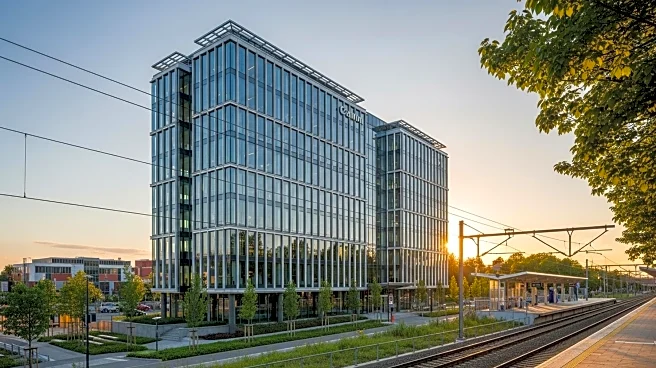What's Happening?
Sanofi has relocated its U.S. headquarters to Morristown, New Jersey, offering a transit-accessible location with numerous amenities designed to attract employees back to the office post-COVID. The new 260,000-square-foot office is strategically located near an NJ Transit station and features an on-site restaurant, flexible workspaces, a rooftop terrace, and a farmer's market. Sanofi's leadership, including Chief People Officer Natalie Bickford, emphasized the importance of creating an environment that encourages face-to-face collaboration. The move is part of a $130 million investment aimed at modernizing workspaces and enhancing employee satisfaction.
Why It's Important?
Sanofi's decision to invest in a new headquarters reflects broader trends in corporate real estate and employee engagement post-pandemic. By prioritizing amenities and accessibility, Sanofi aims to foster a collaborative work environment that attracts and retains top talent. This move highlights the shift towards creating office spaces that offer more than just workstations, focusing on socialization, well-being, and collaboration. The investment in the Morristown office is expected to improve employee retention and productivity, ultimately benefiting the company's bottom line.
What's Next?
Sanofi's new headquarters is likely to set a precedent for other companies looking to modernize their workspaces and enhance employee experience. As businesses continue to navigate the post-pandemic landscape, similar investments in office amenities and accessibility may become more common. Sanofi's focus on sustainability features, such as electric vehicle chargers and public transportation subsidies, may also influence other companies to adopt environmentally friendly practices. The success of this initiative will be closely monitored by industry leaders and may lead to further innovations in corporate real estate.
Beyond the Headlines
The relocation of Sanofi's headquarters raises questions about the future of office work and the balance between remote and in-person collaboration. As companies invest in creating attractive office environments, the cultural and social dynamics of work may shift, impacting employee expectations and work-life balance. Additionally, the emphasis on sustainability and accessibility reflects growing corporate responsibility towards environmental and social issues, potentially influencing broader industry standards and practices.










